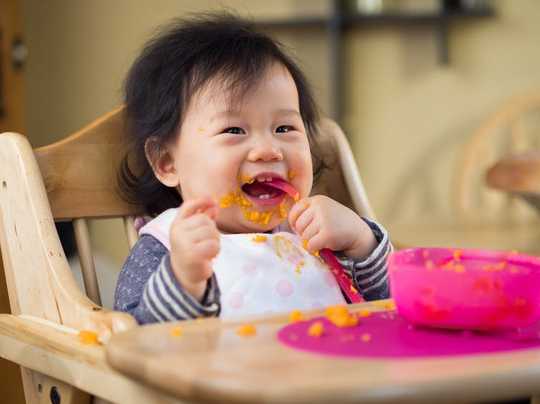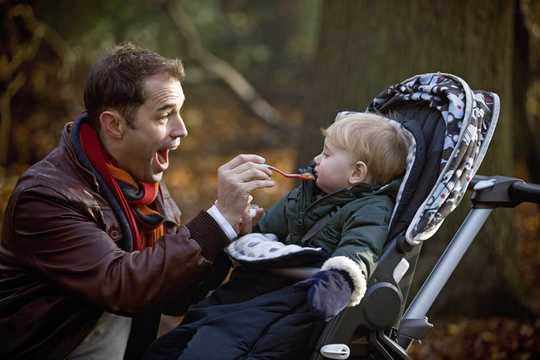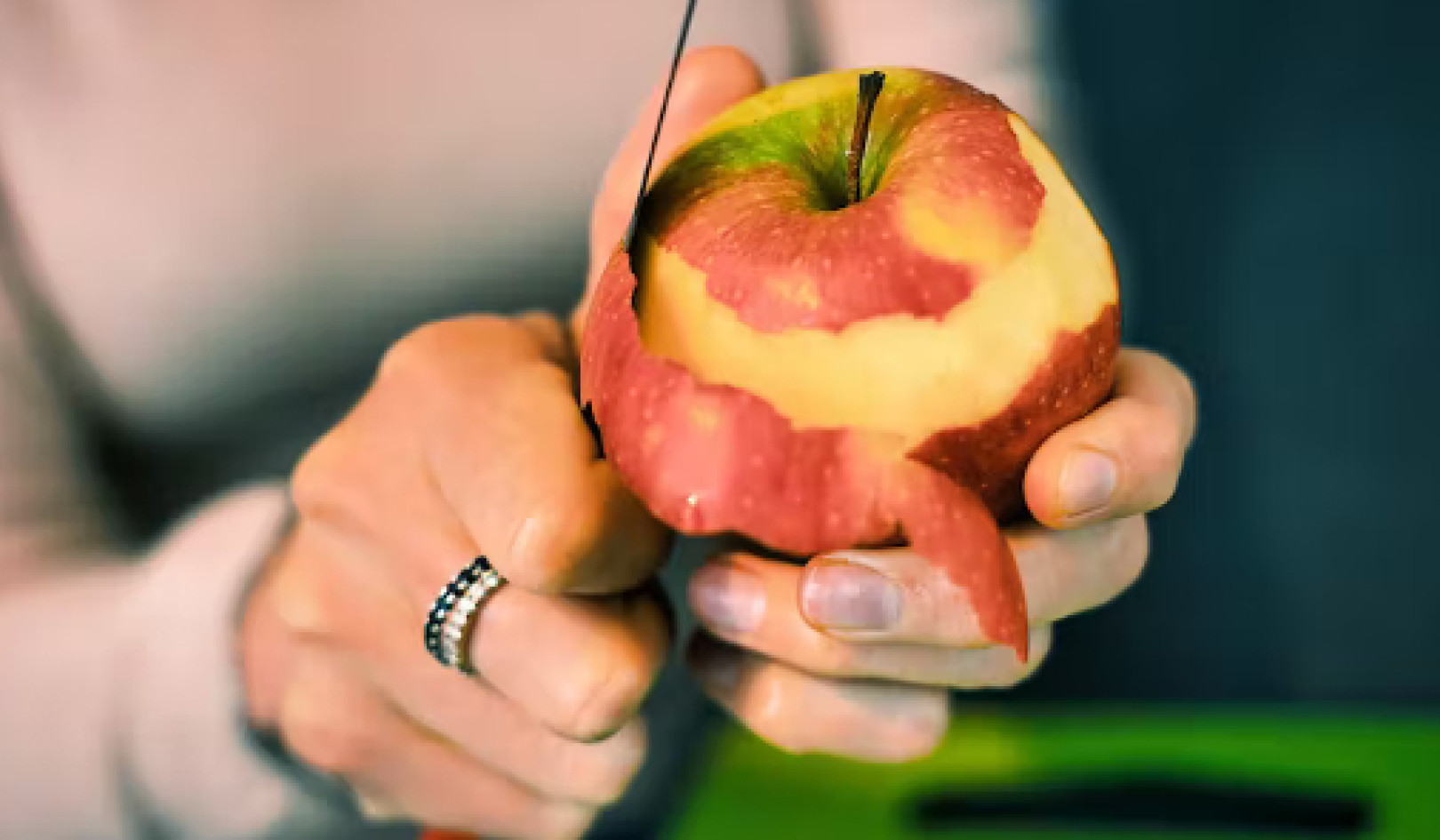 Don’t mind the mess. shutterstock/Mcimage
Don’t mind the mess. shutterstock/Mcimage
How babies are fed is often a topic of hot discussion. It’s known that babies should be introduced gradually to solid foods at around six months old. But in recent years, another question has arisen: should parents be spoon-feeding babies special pureed baby foods or could they just join in with the family and feed themselves from the very start?
Known as baby-led weaning, parents who follow the method believe it has lots of benefits for their baby, such as encouraging them to eat a range of foods and stay a healthy weight. Research suggests that babies who feed themselves are less likely to be fussy and more likely to eat a wider variety of food. But what about their weight?
Research examining this so far has been mixed. But in our new study of 269 babies, we found that when babies were breastfed, there was no difference in weight for those who were spoon-fed or self-fed. But when babies were bottle fed, those who were spoon-fed were heavier than those who self-fed.
This is potentially because as long as babies have some opportunity to be “in charge” of how much they eat, they may be better able to eat according to what they need rather than how much food a caregiver might encourage them to eat.
Milk matters too
Previous research into the impact of solid foods and weight has not really explored how the other part of a baby’s diet – their milk feeds – might play a role.
Indeed, solid foods should only be part of a baby’s diet. Babies who are between six and 12 months should still be getting lots of energy from breast or formula milk. In fact, at six to eight months old, babies only need less than 200 calories a day from solid foods.
Research with older children shows that using a “responsive feeding style”, where lots of healthy options are offered but parents don’t put too much pressure on how much children eat, is associated with a healthier weight and more varied diet. Children are better able to listen to their own hunger cues and don’t crave foods that are “banned” so much – meaning they are less likely to overeat.
Research with younger babies shows that being “responsive” during milk feeds also matters. For example, bottle fed babies who are fed responsively – with parents looking for cues they are full – drink less than those who are encouraged to finish a bottle.
 Breastfeeding allows babies to self-regulate. shurkin_son/Shutterstock
Breastfeeding allows babies to self-regulate. shurkin_son/Shutterstock
Breastfeeding might make responsive feeding easier as you cannot see how much a baby has drunk, so you have to trust they will feed if they are hungry. It’s also difficult to persuade a baby who doesn’t want to breastfeed to do so. But if you are bottle feeding you can see how much is left and might worry that baby needs to finish the bottle.
This might explain why babies who are breastfed are more likely to be able to control their appetite as toddlers and are less likely to be overweight.
Feeding your baby responsively
Decisions around feeding babies are complicated and some mothers might face challenges breastfeeding or worry about giving their baby solid foods. But the good news is that most babies, unless there is a particular medical worry about their growth, should be able to have opportunity to be “in charge” of how much they eat.
If you are bottle feeding, try not to worry too much about when and how much your baby feeds. Instead, try “paced” or “responsive” feeding, where smaller amounts of milk are made up and you watch carefully for signs your baby is full.
To do this gently, offer your baby the bottle by stroking their lip and wait for them to show they are ready –- they will open their mouth if they are hungry. Pause regularly and stop when your baby starts to show signs of being full, such as turning their head or pushing the bottle out. Don’t try to encourage them to finish the bottle.
If you are spoon-feeding, let your baby set the pace of the meal. Offer them small spoonfuls and, again, pause in between, looking for signs they have had enough such as turning their head or pushing lots back out. Don’t try to persuade them to finish a jar or eat too quickly.
 Feeding themselves allows babies to be more in control of the pace and amount they eat. Air Images/Shutterstock
Feeding themselves allows babies to be more in control of the pace and amount they eat. Air Images/Shutterstock
Remember, guidelines suggest that however you feed your baby you can give them finger foods from the start of weaning. Try foods such as soft cooked sticks of parsnip, broccoli or yam, flakes of fish or toast fingers. Cut food into pieces large enough for them to pick up, so that the food sticks out of the top of their fist. But make sure you avoid foods that could snap off in your baby’s mouth such as hard apple slices or raw carrot sticks or small hard foods such as nuts or popcorn.
Some babies might not eat much at first when they self-feed, but don’t worry. Remember, the experience of learning to eat is important too. Letting babies play with food, feeling its texture and learning how it tastes is all part of their development – just put a mat down and try not to worry too much about the mess!![]()
About The Author
Sara Wyn Jones, PhD researcher in Public Health, Swansea University; Amy Brown, Professor of Child Public Health, Swansea University, and Michelle Lee, Professor of Psychology, Swansea University
This article is republished from The Conversation under a Creative Commons license. Read the original article.

Related Books:
Salt, Fat, Acid, Heat: Mastering the Elements of Good Cooking
by Samin Nosrat and Wendy MacNaughton
This book offers a comprehensive guide to cooking, focusing on the four elements of salt, fat, acid, and heat and offering insights and techniques for creating delicious and well-balanced meals.
Click for more info or to order
The Skinnytaste Cookbook: Light on Calories, Big on Flavor
by Gina Homolka
This cookbook offers a collection of healthy and delicious recipes, focusing on fresh ingredients and bold flavors.
Click for more info or to order
Food Fix: How to Save Our Health, Our Economy, Our Communities, and Our Planet--One Bite at a Time
by Dr. Mark Hyman
This book explores the links between food, health, and the environment, offering insights and strategies for creating a healthier and more sustainable food system.
Click for more info or to order
The Barefoot Contessa Cookbook: Secrets from the East Hampton Specialty Food Store for Simple Entertaining
by Ina Garten
This cookbook offers a collection of classic and elegant recipes from the beloved Barefoot Contessa, focusing on fresh ingredients and simple preparation.
Click for more info or to order
How to Cook Everything: The Basics
by Mark Bittman
This cookbook offers a comprehensive guide to cooking basics, covering everything from knife skills to basic techniques and offering a collection of simple and delicious recipes.






















